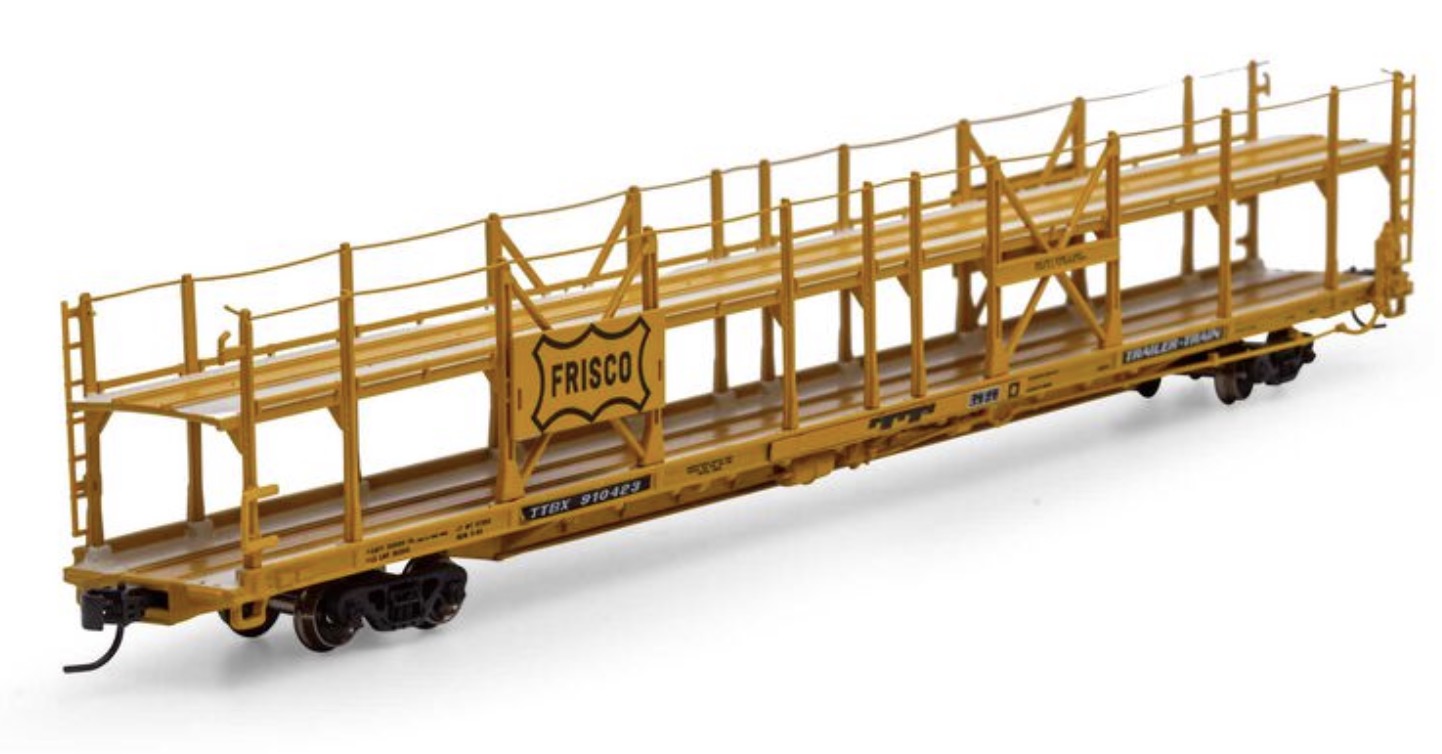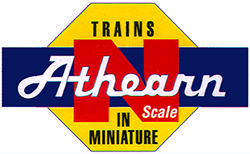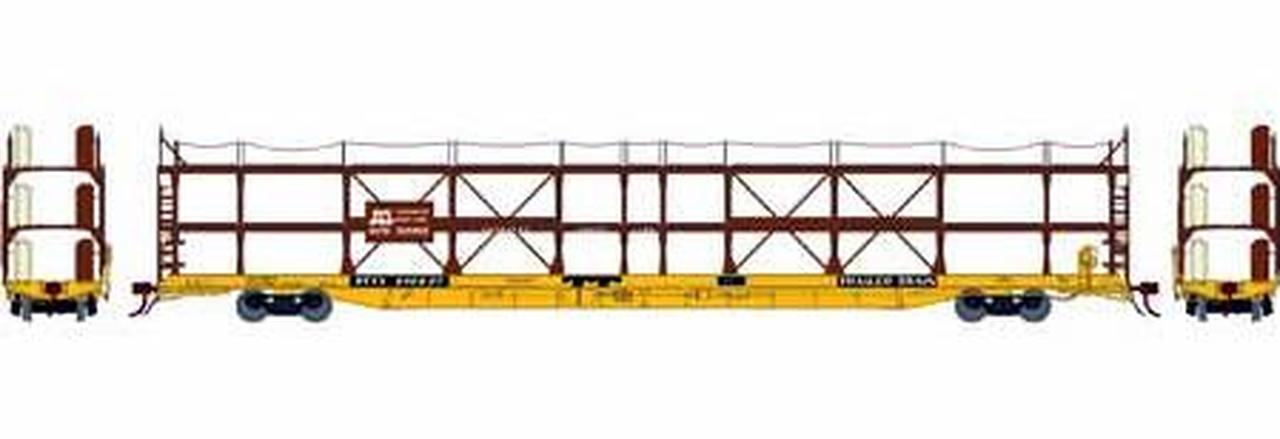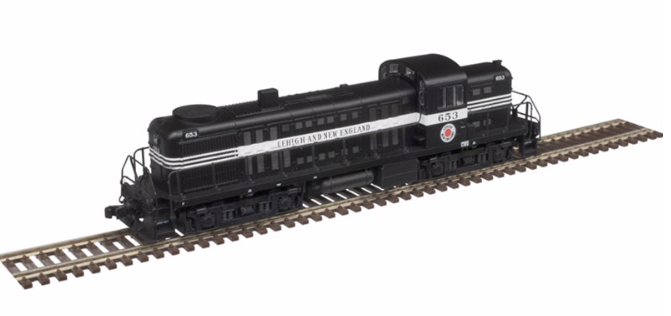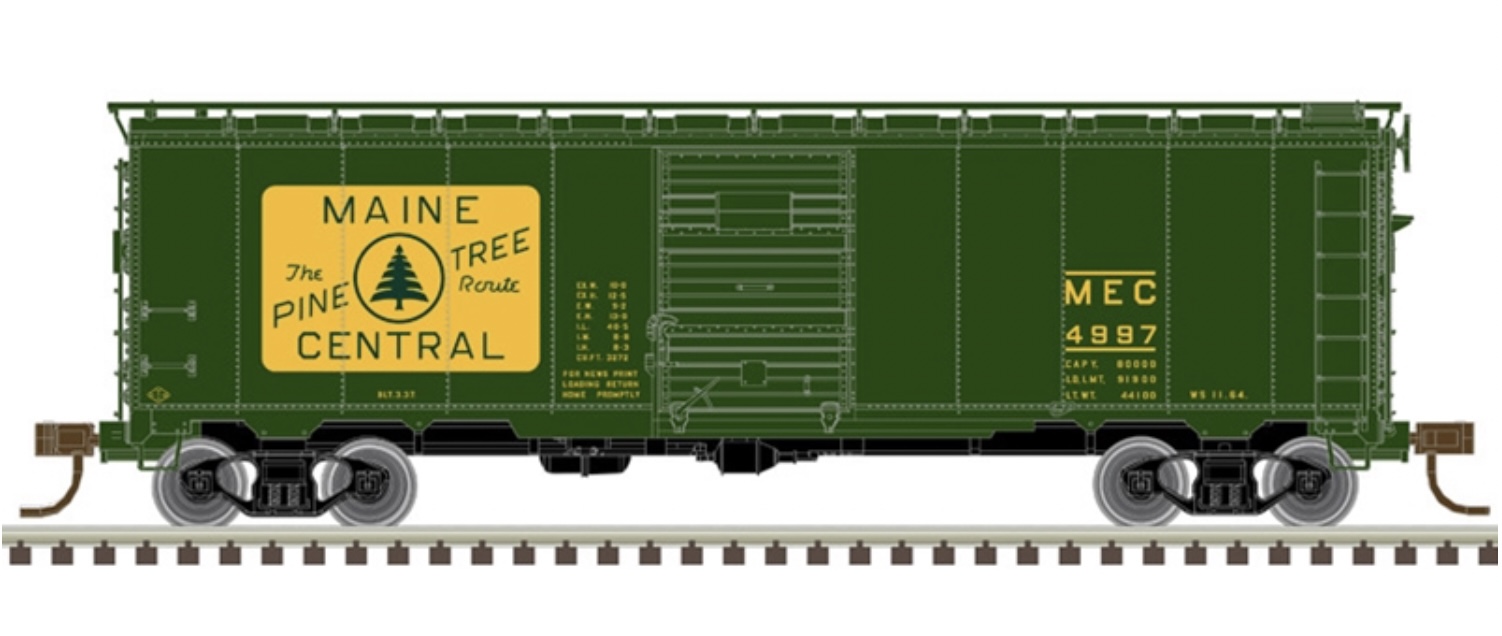Model Information: This Athearn N-scale model was designed from the start to incorporate as many prototype details and variations as possible, based upon field measurements and builder diagrams, in order to appeal to modelers of multiple eras. You can rest assured of its smooth performance, thanks to a heavy die-cast frame for reliable tracking, and our N-scale 70-ton ASF Ride-Control trucks.
Operationally, these cars are appropriate for any layout set from the 1960s to the present day. The Auto Racks would be fastened to the 89' flatcar for auto service from Detroit. The Athearn N-scale Auto Rack features a Bethlehem Steel F89FH with a Whitehead and Kales bi-level rack. High level of detail ensures authenticity to the prototype.
Features: Die-cast underframe - Weighted for trouble free operation - Athentic undulating safety railing - Accurate Whitehead and Kales Auto Rack - End bridge plates per prototype and era - Use for dedicated intermodal trains or mixed freight - Detailed deck - Decorated models fully-assembled and ready to run out of the box - Highly-detailed, injection-molded body - Separately applied hand brake per prototype - 70-Ton roller bearing trucks with 33" scale machined metal wheels operate on Code 55, 70, and 80 rail - Body mounted McHenry operating knuckle couplers - Clear blister packaging for easy viewing - Minimum radius: 10" - Recommended radius: 12"+
Operationally, these cars are appropriate for any layout set from the 1960s to the present day. The Auto Racks would be fastened to the 89' flatcar for auto service from Detroit. The Athearn N-scale Auto Rack features a Bethlehem Steel F89FH with a Whitehead and Kales bi-level rack. High level of detail ensures authenticity to the prototype.
Features: Die-cast underframe - Weighted for trouble free operation - Athentic undulating safety railing - Accurate Whitehead and Kales Auto Rack - End bridge plates per prototype and era - Use for dedicated intermodal trains or mixed freight - Detailed deck - Decorated models fully-assembled and ready to run out of the box - Highly-detailed, injection-molded body - Separately applied hand brake per prototype - 70-Ton roller bearing trucks with 33" scale machined metal wheels operate on Code 55, 70, and 80 rail - Body mounted McHenry operating knuckle couplers - Clear blister packaging for easy viewing - Minimum radius: 10" - Recommended radius: 12"+
Road Name History: 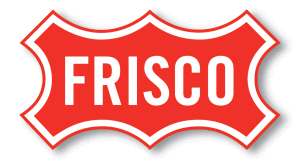 The St. Louis - San Francisco Railway (reporting mark SLSF), also known as the Frisco, was a railroad that operated in the Midwest and South Central U.S. from 1876 to April 17, 1980. At the end of 1970 it operated 4,547 miles (7,318 km) of road on 6,574 miles (10,580 km) miles of track, not including subsidiaries Quanah, Acme and Pacific Railway or the Alabama, Tennessee and Northern Railroad; that year it reported 12,795 million ton-miles of revenue freight and no passengers. It was purchased and absorbed into the Burlington Northern Railroad in 1980.
The St. Louis - San Francisco Railway (reporting mark SLSF), also known as the Frisco, was a railroad that operated in the Midwest and South Central U.S. from 1876 to April 17, 1980. At the end of 1970 it operated 4,547 miles (7,318 km) of road on 6,574 miles (10,580 km) miles of track, not including subsidiaries Quanah, Acme and Pacific Railway or the Alabama, Tennessee and Northern Railroad; that year it reported 12,795 million ton-miles of revenue freight and no passengers. It was purchased and absorbed into the Burlington Northern Railroad in 1980.
The St. Louis - San Francisco Railway was incorporated in Missouri on September 7, 1876. It was formed from the Missouri Division and Central Division of the Atlantic and Pacific Railroad. This land grant line was one of two railroads (the other being the M-K-T) authorized to build across Indian Territory. The Atchison, Topeka and Santa Fe Railroad, ATSF, interested in the A & P right of way across the Mojave Desert to California, took the road over until the larger road went bankrupt in 1893; the receivers retained the western right of way but divested the ATSF of the St. Louis-San Francisco mileage on the great plains. After bankruptcy the Frisco emerged as the St. Louis and San Francisco Railroad, incorporated on June 29, 1896, which also went bankrupt. On August 24, 1916 the company was reorganized as the St. Louis - San Francisco Railway, though the line never went west of Texas, being more than 1,000 miles (1,600 km) from San Francisco.
From Wikipedia

The St. Louis - San Francisco Railway was incorporated in Missouri on September 7, 1876. It was formed from the Missouri Division and Central Division of the Atlantic and Pacific Railroad. This land grant line was one of two railroads (the other being the M-K-T) authorized to build across Indian Territory. The Atchison, Topeka and Santa Fe Railroad, ATSF, interested in the A & P right of way across the Mojave Desert to California, took the road over until the larger road went bankrupt in 1893; the receivers retained the western right of way but divested the ATSF of the St. Louis-San Francisco mileage on the great plains. After bankruptcy the Frisco emerged as the St. Louis and San Francisco Railroad, incorporated on June 29, 1896, which also went bankrupt. On August 24, 1916 the company was reorganized as the St. Louis - San Francisco Railway, though the line never went west of Texas, being more than 1,000 miles (1,600 km) from San Francisco.
From Wikipedia
Brand/Importer Information: Athearn's history began in 1938, when its founder-to-be, Irvin Athearn, started an elaborate O scale layout in his mother's house. After placing an ad selling the layout, and receiving much response to it, Irv decided that selling model railroads would be a good living. He sold train products out of his mother's house through most of the 1940s. After becoming a full-time retailer in 1946, Irv opened a separate facility in Hawthorne, California in 1948, and that same year he branched into HO scale models for the first time.
Athearn acquired the Globe Models product line and improved upon it, introducing a comprehensive array of locomotive, passenger and freight car models. Improvements included all-wheel drive and electrical contact. One innovation was the "Hi-Fi" drive mechanism, employing small rubber bands to transfer motion from the motor spindle to the axles. Another was the double-ended ring magnet motor, which permitted easy connection to all-wheel-drive assemblies. Athearn was also able to incorporate flywheels into double-ended drives.
The company produced a model of the Boston & Maine P4 class Pacific steam locomotive which incorporated a cast zinc alloy base and thermoplastic resin superstructure. It had a worm drive and all power pickup was through the bipolar trucks that carried the tender. This item was discontinued after the Wilson motor was no longer available, and was not redesigned for a more technologically advanced motor.
Athearn's car fleet included shorter-than-scale interpretations of passenger cars of Southern Pacific and Atchison, Topeka & Santa Fe Railroad prototypes. The company also offered a variety of scale-length freight cars with sprung and equalized trucks. The cars could be obtained in simple kit form, or ready-to-run in windowed display boxes. The comprehensive scope of the product line contributed to the popularity of HO as a model railroad scale, due to the ready availability of items and their low cost.
Irv Athearn died in 1991. New owners took control in 1994, but continued to follow Athearn's commitment to high-quality products at reasonable prices. Athearn was bought in 2004 by Horizon Hobby. Athearn was then moved from its facility in Compton to a new facility in Carson, California. In mid-2009, all remaining US production was moved to China and warehousing moved to parent Horizon Hobby. Sales and product development was relocated to a smaller facility in Long Beach, California.
Read more on Wikipedia and Athearn website.
Athearn acquired the Globe Models product line and improved upon it, introducing a comprehensive array of locomotive, passenger and freight car models. Improvements included all-wheel drive and electrical contact. One innovation was the "Hi-Fi" drive mechanism, employing small rubber bands to transfer motion from the motor spindle to the axles. Another was the double-ended ring magnet motor, which permitted easy connection to all-wheel-drive assemblies. Athearn was also able to incorporate flywheels into double-ended drives.
The company produced a model of the Boston & Maine P4 class Pacific steam locomotive which incorporated a cast zinc alloy base and thermoplastic resin superstructure. It had a worm drive and all power pickup was through the bipolar trucks that carried the tender. This item was discontinued after the Wilson motor was no longer available, and was not redesigned for a more technologically advanced motor.
Athearn's car fleet included shorter-than-scale interpretations of passenger cars of Southern Pacific and Atchison, Topeka & Santa Fe Railroad prototypes. The company also offered a variety of scale-length freight cars with sprung and equalized trucks. The cars could be obtained in simple kit form, or ready-to-run in windowed display boxes. The comprehensive scope of the product line contributed to the popularity of HO as a model railroad scale, due to the ready availability of items and their low cost.
Irv Athearn died in 1991. New owners took control in 1994, but continued to follow Athearn's commitment to high-quality products at reasonable prices. Athearn was bought in 2004 by Horizon Hobby. Athearn was then moved from its facility in Compton to a new facility in Carson, California. In mid-2009, all remaining US production was moved to China and warehousing moved to parent Horizon Hobby. Sales and product development was relocated to a smaller facility in Long Beach, California.
Read more on Wikipedia and Athearn website.
Item created by: CNW400 on 2021-02-11 16:29:21. Last edited by CNW400 on 2023-08-25 10:16:02
If you see errors or missing data in this entry, please feel free to log in and edit it. Anyone with a Gmail account can log in instantly.
If you see errors or missing data in this entry, please feel free to log in and edit it. Anyone with a Gmail account can log in instantly.


